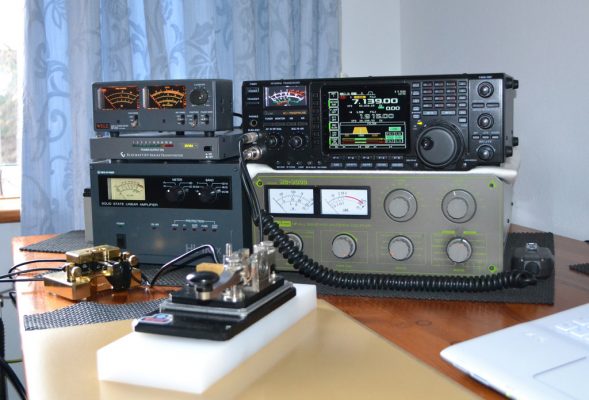
by EVAN MATTHEWS
A man living in Tête Jaune Cache is the Robson Valley’s most recent recipient of a ham radio license.
With his call sign reading VA7BZY, Paul Fretts is now certified for amateur radio transmission. In the early winter months, Fretts decided to become certified because he was looking for a new hobby.
Because Fretts was always good at science, specifically physics, the science involved in radio appealed to him.
Ham Radio — or amateur radio — is a hobby and service bringing people, electronics and communication together, according to the American Radio Relay League (ARRL) website.
People have used amateur radio to talk to people around the world – even astronauts in space.
One of the more interesting aspect to ham radio, is that a person does not require cell reception or internet to communicate and you can use it in remote locations.
“Lots of guys take it up to a mountaintop, string a piece of wire, and see how far (their signal) can get. It’s kind of neat that way, and it’s just a set of headphones and paddle,” – Paul Fretts, amateur radio enthusiast
Another perk is the ability to connect with other users around the world.
“Most of the (ham radio hobbyists) are interested in making distant contact, so if you can talk to Antarctica, Australia or New Zealand, it’s kind of like a feather in the cap,” says Fretts. “You can exchange post cards by making those contacts, so to speak.”
Fretts says there is an emergency preparedness element to it, too, since when other modes of communication are down, radio can still operate.
“Lots of guys take it up to a mountaintop, string a piece of wire, and see how far (their signal) can get,” says Fretts. “It’s kind of neat that way, and it’s just a set of headphones and paddle.”
In Canada, an amateur radio license is a federal license, similarly to a firearms license, as interprovincial licensing falls under federal jurisdiction.
The license only certifies users for amateur radio transmission, not commercial, so Fretts says he couldn’t start a radio station tomorrow.
“The license doesn’t allow a person to transmit recorded material, or discuss any business, charge for your services, etc., this is strictly amateur,” he says.
Fretts is certified only for his basic amateur radio license, not his advanced. There are subtle differences between the basic and advanced licenses, for example, the privilege of operating your own repeater, within the same band, is given only to operators with the advanced license.
Fretts it was $45 for the book, and it didn’t cost anything to write the exam.
For those interested, there is a Prince George Amateur Radio Club, and it’s only $20 a year to join.
Though now certified, Fretts has yet to get a radio, saying it’s something he plans to check off his list soon enough. When Fretts does get his radio, anyone with a scanner can listen for him on local repeater frequencies, which are published on the Federal Government’s website.



